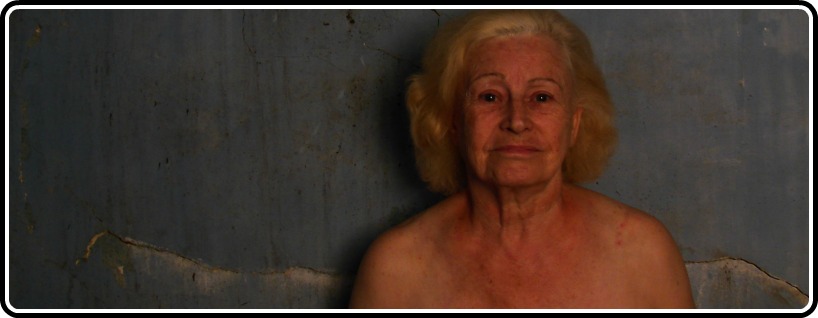
A desolate, tucked away Brazilian village that has eleven remaining inhabitants; all of them are elderly. They are part of a collaborative routine that slowly but surely chugs along, and are inching towards their end with assured complacency. They are closed off from other civilization, surrounded by nature and long-standing stone structures that hark back to a time where all was more active and productive. The remaining villagers go about their days if only to keep themselves going. The village exists in its own cut-off ghostly place and self-discovery is but a myth.
Found Memories, Julia Murat’s delicate first feature-length narrative film, is a meditation on how the presence of the young can affect the old. Madalena (Sonia Guedes) is one of the last inhabitants in the village where the film takes place. Every day she gets up, makes bread, spars with and helps Antonio (Luiz Serra) stock empty shelves so they can sit on a bench for a cup of coffee and goes to church and eats a meal with the other villagers. She ends her days by going home and writing to her deceased husband. One day, a young photographer named Rita (Lisa E. Favero) enters the village looking for a place to stay. She is interested in capturing the village through her camera. Her presence forces Madalena to reflect on her own life and its end, and the village itself is subtly transformed into a heightened awareness of existence.
In many ways, this is the type of festival film that comes with its own set of clichés. Found Memories has sparse and stable compositions, minimal dialogue, a deliberately slow pace and an overall faintness that presides over all. Yet Murat’s compositions are a beautiful regional tribute. The dialogue accurately reflects a village so caught up in its own inaction, making what is said all the more relevant. Its slow pace is integral, appropriately fitting the setting it depicts. And finally, its faintness suggests the fragility of the village as relic, and its people as trapped in a cloudy haze of existent yet unacknowledged memories.
Rita is less of a character in her own right and is more of a plot device. The film incorporates her perspective, but it does little to make it feel her journey matters nearly as much as how she affects those around her. Something that makes Found Memories work is that Murat circumvents the tired direction in which this story could have easily gone. The director has far too much respect for these characters and their simple unpolluted way of life to make Rita a forceful woman who predictably shows the villagers what life is all about. Instead, it is Rita’s presence and youth that make an impact rather than her actions. The inhabitants stop in their tracks when they see her and look with a hesitant hostility. Thankfully, Murat never overly concretes the breakdown of the population’s coldness or the impact Rita has. If she had, Found Memories would not have worked. It is the subtlety in the storytelling that renders this a warming but mournful venture.
Most importantly, Found Memories focuses on how Rita’s presence affects Madalena. The film begins by embedding us in her routine. She does not seem to mind it; it is what she knows. The camera is forced into a rigidity that mimics the confinement of her day-to-day life. Rita’s arrival makes Madalena acknowledge her age, her short time left and the fact that death will soon be approaching. She begins to focus on the past and to reminisce. All it took was for this photographer to stroll into town looking for a place to sleep, which signifies just how barely she had stayed these feelings pent up inside her. Unfortunately, Rita’s character and purpose within the story never feels organic. Murat makes up for that with the way she, and the marvelous Sofia Guedes, portray Madalena’s largely silent recognition of the thoughts and feelings rising within her.
Found Memories has been picked up for distribution by Film Movement and is scheduled for a second quarter release. It has its missteps; a symbolically locked up cemetery (keeping death at bay), hitting a bit too hard with the fact of Rita’s youth, and a final plot development that too easily establishes the film’s point. As a whole though, Julia Murat has made a gently sincere film with her keen eye for powerful visual simplicity. She firmly places us in the world of this decaying village so in need of the slightest of sparks to awaken it into a plain but indispensable awareness. The familiar fondness we grow for this esoteric place, and for the sturdy Madalena within it, is at the heart of Found Memories.


